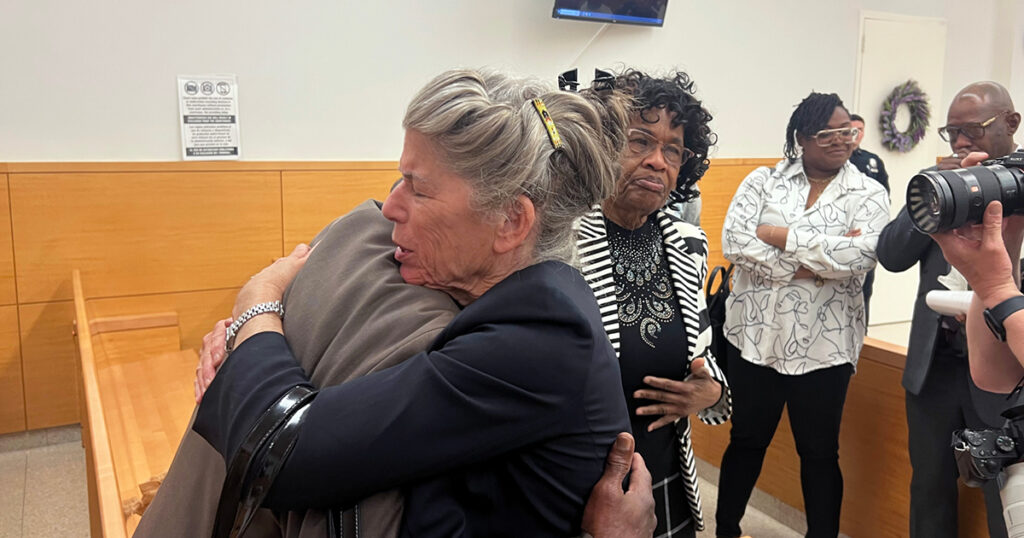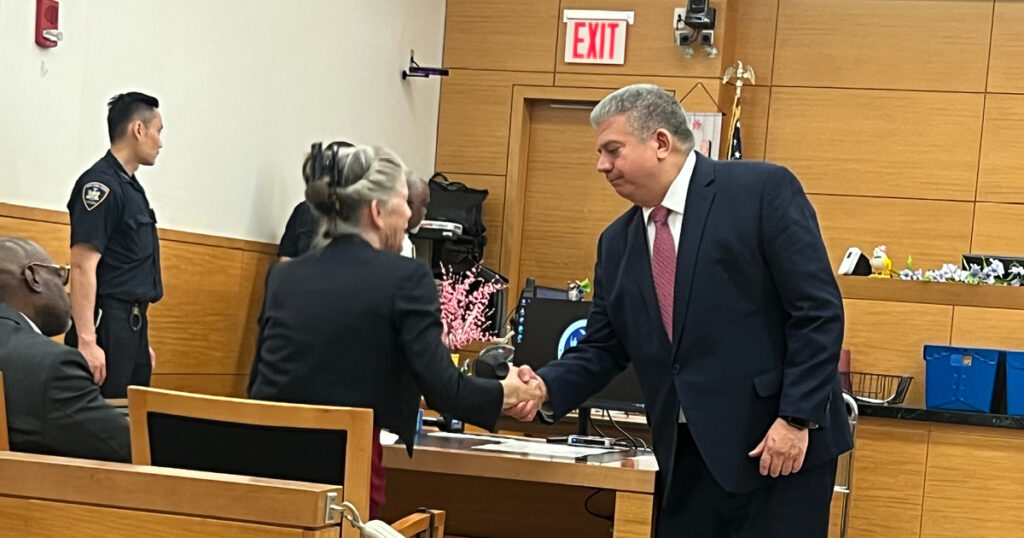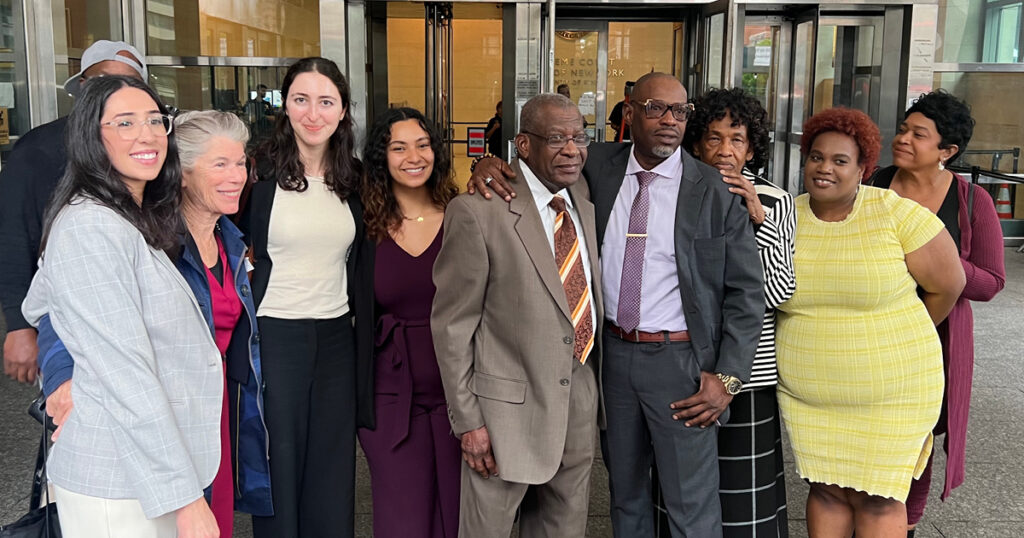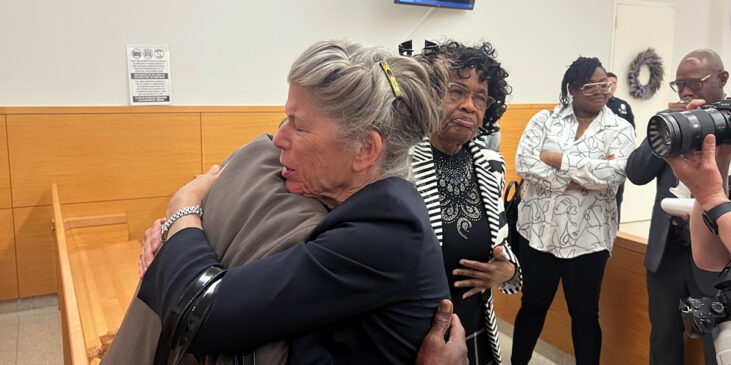
Make a gift and support the Post-Conviction Innocence Clinic’s work.
On May 16, 2024, after serving 23 years in prison, Stephen Carrington, represented by the Post-Conviction Innocence Clinic (PCIC) at New York Law School (NYLS), was exonerated in Brooklyn Supreme Court.
Here is a short synopsis of the case:
On January 2, 1995, two men robbed a housewares/lumberyard on Church Avenue in Brooklyn. One gunman shot and killed the store clerk while grabbing funds from the cash register. His accomplice held a customer at gunpoint and took his ring and watch. Another store employee saw the two men exit the store after the shots were fired.
The store was equipped with a surveillance camera which captured the crime. Unfortunately, the grainy images did not illuminate the perpetrators’ features. The camera also picked up the image of a third man wandering about the store without buying anything just before the crime. That person’s image was clear, and his identity was ascertained. He was Carrington’s younger brother, Mark.
Within days, a shop worker who was across the street from the lumberyard at the time gave police a photograph of Mark Carrington and his friend, Shannon France. The surviving lumberyard employee and the victimized customer viewed photographs in a photo array and each of them identified France. France’s fingerprint was also found on the cash register. The proof against him was clear and convincing. The witnesses did not, however, identify Mark Carrington—who was not one of the two people who entered the store, took the money, and shot the clerk. He had likely left the store by the time of the robbery.
Police discovered that Mark had an older brother—Stephen—who had been arrested in the past. Police didn’t make a new array. They simply substituted Stephen’s picture for Mark’s. According to the police, both witnesses selected Stephen Carrington’s photograph from the array. Stephen was mistakenly identified as being France’s accomplice.
From that moment on, the die was cast. A wrongful identification led to a wrongful arrest and a wrongful conviction and 23 years in prison.
At trial, Stephen Carrington presented a strong alibi corroborated by hospital records. Meanwhile, the prosecution’s identification testimony weakened. The store employee did not identify Carrington at the in-person line-up or at trial, and he testified he didn’t recall making an identification from the photos. Thus, the only evidence of guilt was the memory of the traumatized customer who saw the accomplice for only seconds while France shot the clerk before his eyes. As with so many one eyewitness cases, there was no corroboration of the witness’s memory. There was no DNA evidence, no fingerprints, no weapon recovered, no property recovered. Carrington kept telling everyone that he wasn’t there and didn’t commit the crime, but no one listened, and France never revealed the name of his accomplice, even though people in the neighborhood had a pretty good idea who he was. Shannon France and Stephen Carrington were tried together and both were convicted.
It took Carrington, eventually aided by the PCIC, years and painstaking digging to find scraps of evidence eventually revealing the identity of the second participant in the crime. There were clues buried in France’s testimony before the parole board—where he said Stephen Carrington wasn’t the person with whom he committed the crime and provided the initials of his accomplice. Friends of Carrington tricked the accomplice into revealing himself on a hard-to-hear mini-tape cassette. Neighbors who were across the street from the scene of the crime recalled seeing men—other than Carrington—run from the store after the shots were fired. Finally, the accumulated new evidence became convincing of Carrington’s innocence. The PCIC took the case to the Conviction Review Bureau of the Brooklyn District Attorney’s Office which found the new evidence of innocence, viewed in conjunction with the suggestiveness of the identification, compelling, and agreed to vacate.

The exoneration would never have happened without the persistence and energy of the Conviction Integrity Unit of Brooklyn District Attorney’s Office—thanks to District Attorney Eric Gonzales, Conviction Review Unit Chief Charles Linehan, and Assistant District Attorney Lori Glachman. It never would have happened without many NYLS PCIC students working on the case over many years—thanks to Christina Guillen Galante ’19, Jennifer Mars ’20, Christina Raton ’20, Ciara Santiago ’20, Iris Santiago ’20, and Jena Silverman ’20. It never would have happened without the support of NYLS and the PCIC staff—thanks to Dean Anthony Crowell and all of the school’s faculty and staff. And it certainly never would have happened without the perseverance and dedication of Mr. Stephen Carrington, his family, and his friends in the neighborhood.

Read more about the case in recent news coverage.
- CBS New York (View the segment on YouTube.)
- NBC New York (View the segment on Reporter Melissa Colorado’s page.)
- Murder conviction vacated for Brooklyn man who served 23-year sentence: ‘It’s bittersweet’ (New York Daily News)
- After 23 years served, DA vacates conviction of man falsely accused in Brooklyn lumberyard murder (1010 WINS)
- Brooklyn man exonerated after 23 years for 1995 lumberyard murder (Brooklyn Daily Eagle)
- Judge vacates Brooklyn man’s conviction in 1995 East Flatbush botched robbery case: DA (Brooklyn Paper)
Experiential Learning at New York Law School
Experiential learning is an integral part of the NYLS education. Through our top-tier programs, we offer students the opportunity to turn theory into practice: Starting in their first year, students participate in counseling, interviewing, and negotiating exercises in their foundational Legal Practice course. During their upper-level years, students may select from a wide array of experiential learning courses to hone their lawyering skills. Together with a comprehensive legal education, these experiential offerings prepare our students for careers in advocacy.

